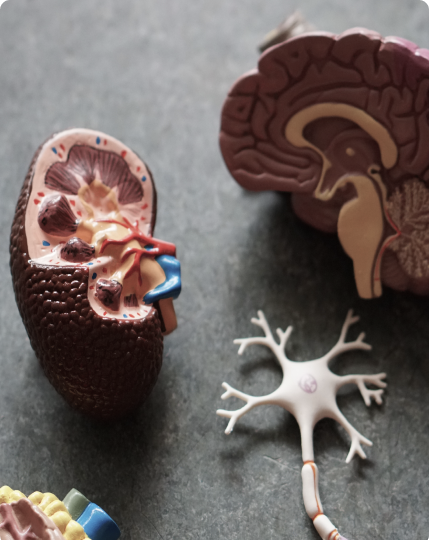Kidney Cancer

The cells in our body may sometimes start dividing uncontrollably and start forming masses of tissue known as tumours. Tumours can be cancerous (malignant) and can spread to other parts of the body, whilst non-cancerous (benign) ones do not spread. If these tumours form in your kidney, there is a possibility that you may have kidney cancer.
Malignant cells that originate in the kidneys can stay localised to one kidney or spread from one kidney to another. It affects twice as many men as women and is most common in middle-aged and older people.
Kidney Cancer Symptoms
The early stages of kidney cancer do not usually cause any discomfort and are usually discovered during an examination for other conditions. When the disease has reached progressed stages, symptoms that may show include:
- Blood in the urine
- A persistent pain in your abdomen, back, or sides that does not go away
- A lump in the abdomen
- A sudden loss of weight and appetite that cannot be explained
- Extreme lethargy
- Occasional fever
- Anaemia (low blood count)
Consult your urologist if you are experiencing any of these symptoms.
CAUSES of Kidney Cancer
Smoking, age, high blood pressure, and obesity increase the likelihood of being diagnosed with kidney cancer.
KIDNEY Cancer Diagnosis
Kidney cancer can be confirmed through different tests.
- Imaging tests can determine if abnormal growths are present in and around your kidneys. These tests include ultrasounds scans, CT scans, and MRI scans.
- A biopsy may be ordered to obtain samples from your kidney to be further tested in the laboratories.
- You may undergo lab testing and urine tests to detect blood in your urine
- Cystoscopy: This helps the doctor see the inside of the urethra, prostate, and bladder to identify any additional tumours in those who have blood in the urine and a kidney tumour.


The cells in our body may sometimes start dividing uncontrollably and start forming masses of tissue known as tumours. Tumours can be cancerous (malignant) and can spread to other parts of the body, whilst non-cancerous (benign) ones do not spread. If these tumours form in your kidney, there is a possibility that you may have kidney cancer.
Malignant cells that originate in the kidneys can stay localised to one kidney or spread from one kidney to another. It affects twice as many men as women and is most common in middle-aged and older people.
Kidney Cancer SYMPTOMS
The early stages of kidney cancer do not usually cause any discomfort and are usually discovered during an examination for other conditions. When the disease has reached progressed stages, symptoms that may show include:
- Blood in the urine
- A persistent pain in your abdomen, back, or sides that does not go away
- A lump in the abdomen
- A sudden loss of weight and appetite that cannot be explained
- Extreme lethargy
- Occasional fever
- Anaemia (low blood count)
Consult your urologist if you are experiencing any of these symptoms.

Causes of Kidney Cancer
Smoking, age, high blood pressure, and obesity increase the likelihood of being diagnosed with kidney cancer.
Kidney Cancer Diagnosis
Kidney cancer can be confirmed through different tests.
- Imaging tests can determine if abnormal growths are present in and around your kidneys. These tests include ultrasounds scans, CT scans, and MRI scans.
- A biopsy may be ordered to obtain samples from your kidney to be further tested in the laboratories.
- You may undergo lab testing and urine tests to detect blood in your urine
- Cystoscopy: This helps the doctor see the inside of the urethra, prostate, and bladder to identify any additional tumours in those who have blood in the urine and a kidney tumour.
Kidney Cancer Treatment Options
If kidney cancer is confirmed, the recommended treatment will depend on the stage of kidney cancer and your overall health. Early kidney cancers have a high cure rate when treated with surgery. For those who are not surgically fit, tumour ablation with radiofrequency or cryotherapy may be considered. In late advanced stages, in addition to surgery, other additional treatments may include targeted therapy, immunotherapy and chemotherapy.
A common surgical procedure is Radical Nephrectomy, which is the surgical removal of the kidney with all the cancer cells. The nephrectomy may be radical (which removes the entire kidney and tumour) or partial (which removes the tumour and some kidney tissue). A partial nephrectomy preserves the kidney function. This surgery is effective for some tumours. It is associated with fewer side effects and a faster recovery.
Robotic and laparoscopic surgery is a minimally invasive method of kidney cancer surgery. During laparoscopic surgery, a surgeon makes a few small incisions rather than the traditional one large incision in the abdomen. The surgeon then inserts a telescopic equipment into the small keyhole incisions to completely or partially remove the kidney. Sometimes, the surgeon uses robotic instruments during the surgery.
Why should you choose Dr Colin Teo to perform your kidney cancer treatment?
Dr Colin Teo is the Founding Head of Khoo Teck Puat Hospital’s Urology Department, with years of experience in minimally invasive keyhole surgery, operating with precision surgical techniques. Many fellows have trained under his mentorship. He did a Fellowship in EndoLaparoscopy and Andrology at St James’ Hospital in Leeds, UK, and was sponsored for a Senior Healthcare Medical Development Program (HMDP) in Advanced Laparoscopic and Robotic Surgery at University of Southern California (USC) Keck Hospital in Los Angeles, USA.
Seek recommendations on suitable treatment options for Kidney Cancer with Colin Teo Urology. Contact us to book an appointment today.